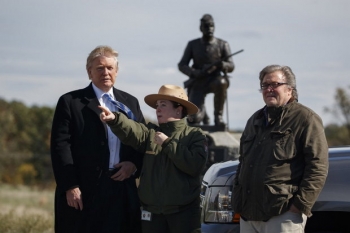
What happens to Louisiana environment under Trump administration?
Link to see the whole article: http://www.nola.com/environment/index.ssf/2016/11/trump_louisiana_environment.html
Fracking finds favor
Among the concerns raised by many environmental advocates about the Trump administration are his campaign statements to dismantle the Environmental Protection Agency to move quickly to drop rules governing air and water emissions and to weaken or eliminate the Waters of the U.S. rule, which strengthens the ability of EPA and the corps to apply Clean Water Act restrictions to wetlands away from coastlines.
But Rob Verchick, an environmental law professor at Loyola University and president of the Center for Progressive Reform, said Trump will at least be slowed in those efforts by both existing federal law and the bureaucratic process he's promised to change. "I think the big message here is that our regulatory structure is actually built to put the brakes on rapid change, and that works both ways, both for pro-environmental concerns and for anti-environmental concerns," Verchick said.
"No president has the power of fiat to just eliminate things," he said. "So while it's true that a Trump administration could do a lot of damage to environmental protection or change the jurisdiction of the Clean Water Act in certain ways or scuttle climate change regulations, in the U.S. those things can't happen instantly and not without serious opposition by not only environmentalists but many industries that have already adapted to the new rules, made innovations to do so."
For instance, the Waters of the U.S. rule was put into effect after a multi-year effort by EPA and the corps to develop the regulation. It was actually the agency's response to several U.S. Supreme Court decisions that limited the agencies' actions under the Clean Water Act.
"You need to go through a similar lengthy rule process to erase the new rule," Verchick said, "including an evidentiary record, legal justifications, a public notice process. And when that new rule is promulgated, it's likely to be the subject of litigation that can go on for years.
"It's not easy for an agency to just rescind a regulation, especially if it's just a political decision instead of because of same factual change in the record or new universal scientific understanding of how the regulation doesn't work," he said.
The Clean Power Plan, a Clean Air Act rule that limits emissions from coal-fired power plants, is another example of a rule that was developed over several years in response to Supreme Court opinions. One of those said climate change exists and that the EPA has the responsibility to regulate emissions to control it.
That rule is now before a federal court because of challenges over whether EPA has properly interpreted the law and the constitution, Verchick said. Even if Trump were to order the Justice Department to stop defending the rule, it's likely others who have intervened in the case would take their place, he said.
"Then, if it's found to be legal by the D.C. Circuit Court of Appeals, what happens then?" Verchick said. Because it's only being heard by a three-judge panel of the appeals court, it can be appealed to the full court. But that court has only 16 judges, as Congress has failed to approve an Obama nominee for a 17th seat, and the result could be a tied court. The same situation could occur if the lower court decision is appealed to the Supreme Court, as Congress also has refused to appoint Obama's candidate there.
Putting on the brakes
Where the Trump administration does have a tactical advantage is in not enforcing the regulations it does not like. "One way to unravel things is just by putting the brakes on what happens in the agency, in so many words telling federal employees to go slow and don't do very much, stop working," Verchick said.
That might also be the only way to rein in regulations other areas where Trump has promised to upend enforcement, Verchick said.
"But the thing the public needs to understand is that it's not the agencies or the president who determines what regulations we need and what regulations we don't," he said. "It's the statutes themselves that require agencies to develop regulations about health, safety and the environment, and the reason we have so many regulations is that this is what Congress required EPA and other agencies to do.
"So, every time they delay enforcement, they're subject to a lawsuit," he said.
Graves said Congress recognizes those limitations, and already has tried to pass legislation that would, for instance, rescind the Waters of the U.S. rule and require EPA and the corps to "engage stakeholders again on a more appropriate definition (for wetlands) and update the rules based on that input, including from parishes, counties and states."
